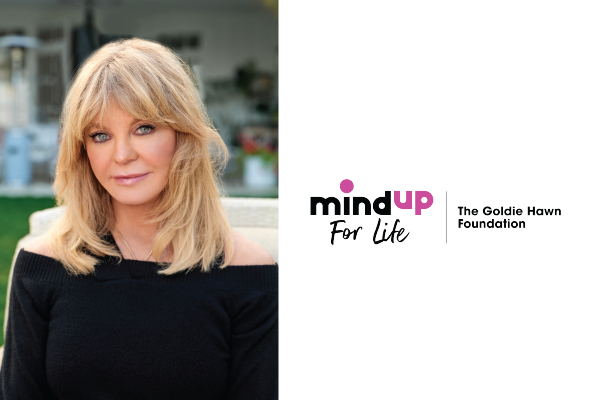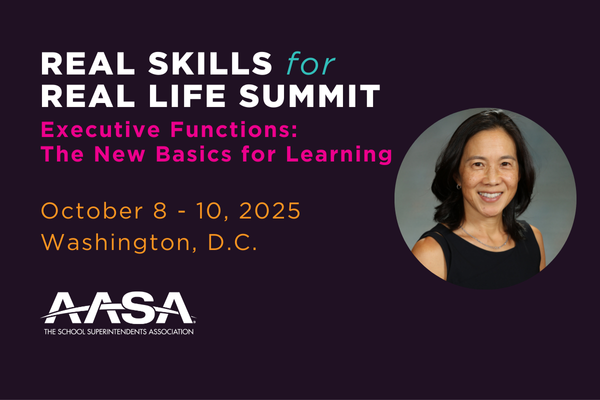‘I Want the World to be Better for Our Children,’ Says Goldie Hawn at Virtual Forum Focusing on Scaling Up Mental Health Support in Nation’s Schools
August 29, 2023
Event Hosted by AASA Leadership to Help School Districts Address Mental Health Crisis
According to the latest Youth Risk Behavior Survey released by the Centers for Disease Control, nearly half (42%)
of our nation’s children felt “persistently sad or hopeless” while nearly one third (29%) experienced poor mental health. Meanwhile, the CDC estimated that 12.3 million Americans seriously thought about suicide in 2021, while 3.5
million planned a suicide attempt and 1.7 million attempted suicides.
These grim reminders come at a time when 50 million children are returning to school for the 2023-24 academic year.
“We want our classrooms to be a special world. The health of our children will be the health of our country,” said Goldie Hawn, the creator of MindUP, a program helping children develop
the mental fitness to thrive in school and throughout their lives.
Hawn teamed up with AASA leadership and national education leaders on Aug. 14, 2023, in a virtual forum to discuss how scaling up mental health support and social and emotional learning can have a profound impact on our nation’s young learners.
 Goldie Hawn, founder of MindUP, teamed up with AASA and participated in a virtual forum aimed at the need to strengthen support for mental health throughout the U.S.
Goldie Hawn, founder of MindUP, teamed up with AASA and participated in a virtual forum aimed at the need to strengthen support for mental health throughout the U.S.“We’re in an epidemic, a true epidemic of mental disturbance. A fearful brain cannot learn.”
“I am a lover of all young children in the world and believe that their potential is not being realized,” said Hawn. “We’re in an epidemic, a true epidemic of mental disturbance. A fearful brain cannot learn.”
Paul Imhoff, AASA past president and architect of AASA’s “Live Well. Lead Well.” campaign, kicked off the 90-minute program, crafted for members of AASA’s
SEL and Mental Health Leadership Network Cohorts as well as Learning 2025 Network participants.
“As we begin another school year, we know that the well-being of our students and staff continues to be a top priority for each of us,” he said. “Students who are not well cannot learn. Leaders who are not well, cannot lead or serve.
This is absolutely foundational. Mental health and social and emotional learning have to be part of the work we’re doing so kids can learn and grow.”
“Prioritizing mental health and SEL is a moral imperative and an investment in the overall development, academic success and wellbeing of our students,” added Gladys Cruz, district superintendent of Questar III BOCES in Castleton, N.Y., and
the 2023-24 president of AASA.
Cruz called on all school district leaders to continue building positive school environments to reduce the stigma that comes from seeking help and support for mental health. “The past several years have been challenging for everyone, but especially for our learners. The pandemic social isolation and increased use of social media have taken a toll on our children's mental health.”
“Who has the opportunity to transform that individual, that family or that entire community more than (a superintendent)? I thank you for embracing the opportunity to move forward in ensuring that we have future-driven schools that leave no learner marginalized, and that our focus is on the whole learner.”
“Being a school system leader is a tremendous responsibility but it’s a huge opportunity,” said David Schuler executive director, AASA. “Who has the opportunity to transform that individual, that family or that entire community
more than (a superintendent)? I thank you for embracing the opportunity to move forward in ensuring that we have future-driven schools that leave no learner marginalized, and that our focus is on the whole learner.”
With Imhoff serving as moderator, the program featured a panel discussion that included Hawn, Tony Sanders, the state superintendent of Illinois, and Gregg Behr, executive director of the Grable Foundation. Only a few months into the job as state superintendent, Sanders shared the personal struggles he was having while leading U-46, Illinois’ second-largest school district.
“I was ready to quit. I was not in a healthy place, mentally or physically,” said Sanders. Through his friendship with Hawn, he began taking her advice and counsel “and I began putting my own mental health first and foremost.”
Sanders also pointed to technology as a catalyst behind some of the problems facing kids today. “Social media has created a lot of issues, at least in the schools when I was a superintendent, both positive and negative. It gives kids an opportunity
to socialize, but it also gives students the opportunity to bully one another or engage in inappropriate conduct,” he said. “The social pressures students feel today are higher than they were when I was growing up, including peer relationships.”
“We’ve got to talk publicly about love and what it means to love our kids so that they’re in the best possible position to become the best of whoever they are,” said Behr, a member of the AASA National Commission on Learning 2025
and a key supporter of the Western Pennsylvania Learning 2025 Alliance.
“We’ve got 34 districts in the Western Pennsylvania Learning 2025 Alliance,” said Behr. “As a system and as a region, they’re thinking systematically about the culture we need to create. We only have 200 days in second grade
or 10th grade but they spend the first couple of weeks really focused on relationships and the relationships classroom teachers have not only with their students but also with parents, families and caregivers.”
Two Giants in Mental Health and Suicide Prevention
Other guests of the program included the leadership of two of America’s leaders in mental health and suicide prevention: The Cook Center for Human Connection and The Jed Foundation (JED), partnering organizations with AASA in its Mental Health Cohort.
The Cook Center’s current focus is on supporting children, families, and schools in eradicating suicide, as well as offering resources and support for those with mental health issues and their caregivers.
“We help educators help parents help their children,” said Anne Brown, president and CEO of the Cook Center. “We work with the schools because that's where parents and children are, but we know that there isn’t enough help and
support in schools. We help parents become the first line of support when they’re working with their children with anxiety and depression.”
Earlier this year, JED and AASA launched a multi-year initiative to develop and deploy a comprehensive approach to mental health and suicide prevention for school districts. The District Comprehensive Approach will provide PreK-12 school districts across the nation with an evidence-based framework—combined with expert support, best practices, and data-driven guidance—to protect mental health and prevent suicide for millions of students.
“JED is actioned-focused just like the work here and in Learning 2025 and the Mental Health Cohort,” Jennifer Reed, senior director, school and district programs, JED, an organization that partners with high schools and colleges to strengthen
the mental health substance, misuse and suicide prevention programs. “We take a data-informed and values-driven approach to identifying supports, opportunities and enhancements for your schools and districts.”
Superintendents Panel
Ann Levett, then superintendent of Savannah-Chatham County School System, hosted the AASA SEL Cohort Spring Meeting as well as the 2020 Youth Apprenticeship Summit. She is
also a member of the Learning 2025 Commission. Currently serving as assistant executive director at AASA, she presided over a superintendent’s panel that made up the forum’s final presentation.
“We're all working to ensure that school leaders have everything that we can possibly give them to tackle this work,” said Levett. “We are all willing to acknowledge now the needs that we have around ensuring mental wellness.”
Rounding out the panel were Dan Bridges of Naperville (Ill.) Community Unit School District 203 and Dawn Apodaca of Mountain Air (New Mexico) Public Schools.
Bridges, whose district was a 2022 AASA Learning 2025 Lighthouse Demonstration System, talked about the importance of social and emotional learning in our schools and warned not to think of it as something that’s being added to the plate. “We
think of all the things we have to do to support students. (SEL is not) one more thing that’s added to our plate,” he said. “It is the plate. I think it's helping our staff really see the interconnectivity between social, emotional
learning, mental health support and work in the classroom.”
“Building relationships is extremely important,” said Apodaca. “That's our number-one mission. We are able to accomplish that through creative scheduling. We were getting kids to talk and tell us what the problems are and feel safe in
those conversations. We’re trying to think outside the box. It became a whole community (effort).”
“We have to lock arms,” said Imhoff during his remarks to conclude the program. We have to do this work together. We have to take care of one another, so we can serve.”
Click here to view the AASA Virtual Forum. (Passcode: Ez96E.!F)
Interested in joining AASA’s Mental Health and/or SEL Cohorts? Visit AASA’s cohorts page. If you’re interested in learning more about the AASA Learning 2025 Network, contact Mort Sherman, senior associate executive director, AASA Leadership Network, at msherman@aasa.org, or Ann Levett, assistant executive director, AASA Leadership Network at alevett@aasa.org.


